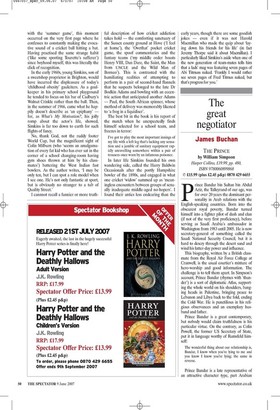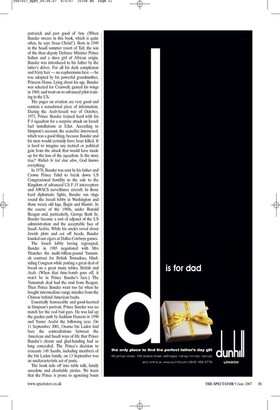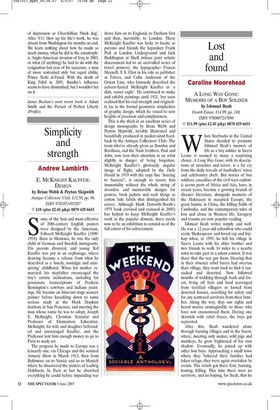The great negotiator
James Buchan THE PRINCE by William Simpson Hatper Collins, £19.99, pp. 480, ISBN 9780060899868 £15.99 (plus £2.45 p&p) 0870 429 6655 prince Bandar bin Sultan bin Abdul Aziz, the Talleyrand of our age, was for over 20 years the dominant personality in Arab relations with the English-speaking countries. Born into the obscurest royal poverty, Bandar turned himself into a fighter pilot of dash and elan (if not of the very first proficiency), before serving as Saudi Arabia's ambassador in Washington from 1983 until 2005. He is now secretary-general of something called the Saudi National Security Council, but it is hard to descry through the desert sand and wind his latter-day power and influence.
This biography, written by a British classmate from the Royal Air Force College at Cranwell, is the usual courtier's mixture of hero-worship and good information. The challenge is to tell them apart. In Simpson's account, Prince Bandar (rhymes with 'thunder') is a sort of diplomatic Atlas, supporting the whole world on his shoulders, banging heads in Palestine, bringing peace to Lebanon and Libya back to the fold, ending the Cold War. He is punctilious in his religious observances and an exemplary husband and father.
Prince Bandar is a great contemporary, but nobody would claim truthfulness is his particular virtue. On the contrary, as Colin Powell, the former US Secretary of State, put it in language worthy of Rumsfeld himself: The wonderful thing about our relationship is, Bandar, I know when you're lying to me and you know I know you're lying; the same in reverse.
Prince Bandar is a late representative of an attractive character type, part Arabian patriarch and part good ol' boy. (When Bandar swears in this book, which is quite often, he says 'Jesus Christ!'). Born in 1949 in the Saudi summer resort of Taif, the son of the then deputy Defence Minister Prince Sultan and a slave girl of African origin, Bandar was introduced to his father by the latter's driver. For all his dark complexion and frizzy hair — no euphemisms here — he was adopted by his powerful grandmother, Princess Hussa. Lying about his age, Bandar was selected for Cranwell, gained his wings in 1969, and went on to advanced pilot training in the US.
The pages on aviation are very good and contain a sensational piece of information. During the Arab-Israeli war of October, 1973, Prince Bandar trained hard with his F-5 squadron for a surprise attack on Israeli fuel installations at Eilat. According to Simpson's account, the ceasefire intervened, which was a good thing, because Bandar and his men would certainly have been killed. It is hard to imagine any tactical or political gain from the attack that would have made up for the loss of the squadron. Is the story true? Wallah hi lad shai alim, God knows everything.
In 1978, Bandar was sent by his father and Crown Prince Fahd to break down US Congressional hostility to the sale to the Kingdom of advanced US F-15 interceptors and AWACS surveillance aircraft. In those hard diplomatic fights, Bandar ran rings round the Israeli lobby in Washington and those weary old lags, Begin and Shamir. In the course of the 1980s, under Ronald Reagan and, particularly, George Bush Sr, Bandar became a sort of adjunct of the US administration and the acceptable face of Saudi Arabia. While his uncles raved about Jewish plots and cut off heads, Bandar handed out cigars at Dallas Cowboys games.
The Israeli lobby having regrouped, Bandar in 1985 negotiated with Mrs Thatcher the multi-billion-pound Yamamah contract for British Tornadoes, blindsiding Congress while putting a great deal of bread on a great many tables, British and Arab. (When that time-bomb goes off, it won't be in Prince Bandar's face.) The Yamamah deal had the nod from Reagan. Then Prince Bandar went too far when he bought intermediate-range missiles from the Chinese behind American backs.
Essentially honourable and good-hearted in Simpson's portrait, Prince Bandar was no match for the real bad guys. He was led up the garden path by Saddam Hussein in 1990 and Yasser Arafat the following year. On 11 September 2001, Osama bin Laden laid bare the contradictions between the American and Saudi ways of life that Prince Bandar's charm and glad-handing had so long concealed. The Prince's decision to evacuate 148 Saudis, including members of the bin Laden family, on 13 September was an uncharacteristic act of panic.
The book tails off into table talk, family anecdote and charitable pieties. We learn that the Prince is prone to agonising bouts of depression or Churchillian 'black dog'. After 9/11 blew up his life's work, he was absent from Washington for months on end. We learn nothing about how he made so much money, what he did in the catastrophic Anglo-American invasion of Iraq in 2003, or what (if anything) he had to do with the resignation last year of his successor, a man of more restrained style but equal ability, Prince Turki al-Faisal. With the death of King Fahd in 2005, Bandar's influence seems to have diminished, but I wouldn't bet on it.
James Buchan 's most recent book is Adam Smith and the Pursuit of Perfect Liberty (Profile).






























































 Previous page
Previous page